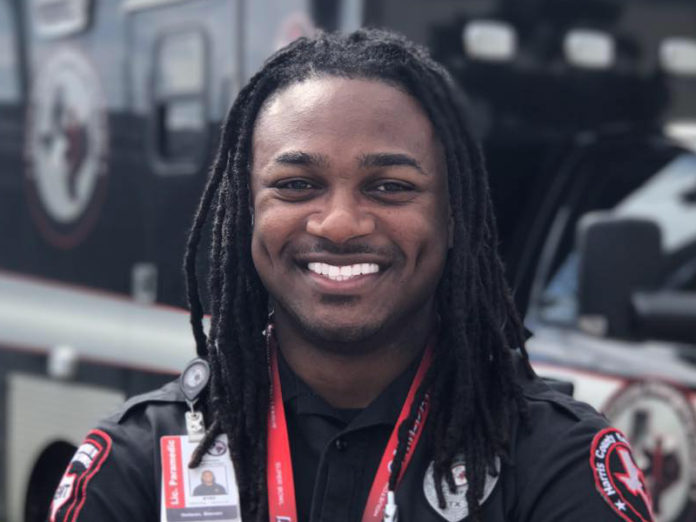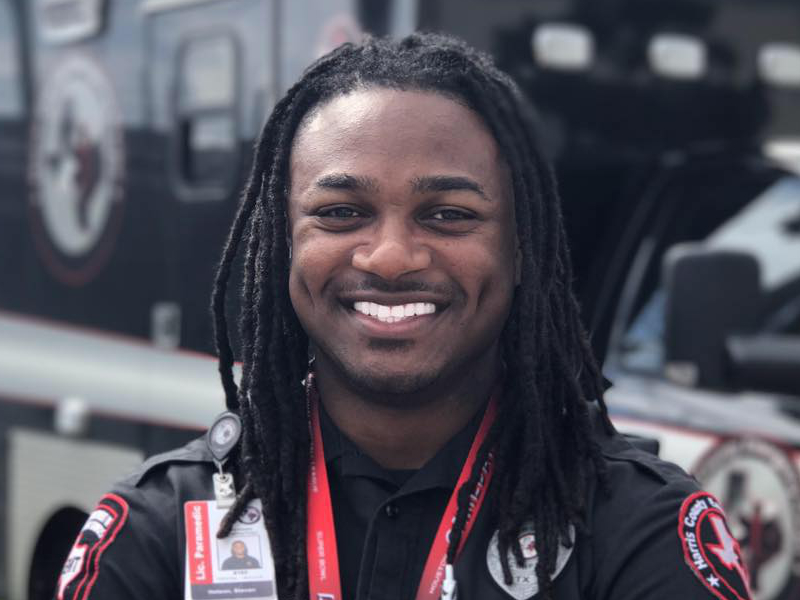Introduction
African Americans, and minorities in general, have come a long way with regards to healthcare, specifically in civilian emergency medical services (EMS). Of the almost 329 million people residing in the United States, only 13.4% are Black or African American.1 In 2020 there were found to be 173,909 paramedics with 6.3% found to be Black or African American.2 I am proud to be a part of that elite 10,956, but there have been countless less-than-perfect circumstances that come with being included in my demographic group.
Education
Walking into paramedic school as an African American should be not much different then anything else we have encountered in life. The makeup of the classroom matches the demographics found within the profession as a whole, but it can still be a bit overwhelming. Knowing you may be the only Black person in your cohort, you revert back to a saying you were often taught as children by your parents – “You have to be twice as good to get half as much.” With this mantra, one must understand that you have to be stellar to stand out among the rest of your cohort.
Though Houston, TX, is extremely diverse when it comes to races and ethnicities, as is the college I attended for my EMS degree, I found myself to be the only Black guy in my paramedic class for the entire two years of our program. At the time, I knew nothing of the demographic makeup within the profession, nor did I care. I came from the U.S. Navy as a hospital corpsman where we were all wore the same uniform and fostered the same ideology of rendering care to those in need. That was the attitude I had going into paramedic school.
Related
While in college however, I was met with some negative experiences from classmates who knew absolutely nothing about me. Rather than debate with them on issues that would likely go nowhere, I proved myself by standing out in each exam, each course, and each semester to where I was the go-to person for study sessions and notes. My best friend during paramedic school just happened to be the only Hispanic male within our cohort.
We both graduated as the top two in our class before going on to obtain our Batchelor of Science degree in Emergency Health Science. He went on to obtain his Bachelor of Science in Nursing and currently works as a surgical trauma intensive care unit nurse in one of Houston’s two Level 1 trauma centers. I chose a route in a more administrative setting to engage in advocacy.
Many paramedics stop after paramedic school and enjoy working on an ambulance their entire career, others become critical care paramedics, flight paramedics, emergency room technicians, and some go on to become registered nurses, mid-levels providers or physicians. Being someone who wanted to stand out, I went back to school and obtained my master’s degree in healthcare administration where the focus of many of my projects and papers were centered on EMS.
Currently, I am a doctoral student of health administration with a concentration on policy and advocacy where again I primarily center my research and projects on pre-hospital medicine. I want to become a leader in my field, and despite the fact I may fail sometimes, my experiences and education is something that can never be taken away, and it certainly sets one apart from someone who wishes to remain complacent.
Challenges
Navigating through EMS as an African American male has had many ups and downs. Being called the “n-word” by patients, hearing white colleagues use the word, hearing negative stereotype spewed about myself and Black people, pre-judgement of patients prior to arriving at calls, and even a lack of empathy and sympathy toward people of other races were all challenges I have encountered during my tenure as a paramedic.
This really opened my eyes and made me second-guess my decision of choosing prehospital medicine as a long-term career choice. If we are being honest here, I started to think people in this field were no different than some law enforcement officers I encountered. One thing I found however, was that despite things some of these EMS practitioners said, I found none of them treated patients any differently. Still, I knew I could not quit because I wanted to be a voice someday for other young Black paramedics or those interested in the field.
To sum it up, there was a lack of cultural competence. Some people may be that way because that is just who they are. I find majority of EMS practitioners simply do not know any better because there are not many minorities in this field to educate them on their ignorance. At my first job as a paramedic, I found myself to be one of three Black paramedics at an agency with more than 200 other field staff personnel. This was a very conservative organization where the paramedics and administrative staff closely matched the demographic makeup of the community they served.
Being Black, male, and gay, I definitely stood out, but not in the way I wanted. My supervisor at the time treated me no differently, advocated on my behalf when he saw unfair treatment by his colleagues, and we are really good friends to this day; I was just not a good fit for that organization. Though I am still only one of four of the Black paramedics with my current agency, I feel more comfortable serving the community that I not only live within, but I am able to treat and transport patients of many different cultural backgrounds.
Not only that, I found there were also lesbian women, gay men, bisexual individuals, and even a trans person all within leadership roles and in the field. Even though I was found to be one of the few Black paramedics, I felt comfortable and a sense of security because I could be unapologetically Black and gay at a progressive agency where I did not feel as though I was secretly judged. For one of the very few times in my life, I felt included.
Advancement is difficult to come by, and I am sure many paramedics have this issue. This is the primary reason I continue to advance my education outside of EMS by earning additional degrees, and within EMS by obtaining different certifications, volunteering to help on various committees, welcoming and teaching paramedic intern students, and assisting with classes within my place of employment and at the college I graduated from.
Triumphs
Something that makes me feel great about being an African American paramedic is the surprise on Black people’s faces and the relaxation in their eyes when they see I look like them. This is extremely important because these patients are not afraid to be open about their complaints which helps me in providing the correct treatment for their acute condition. It also reduces the chance they may either change their stories or add additional concerns I could have addressed prior to their arrival at the hospital.
If any of you have been in EMS a while, then you know how patients change their symptoms when they finally see the doctor. This has you looking dumbfounded in front of the doctor you just gave report to. Multiple reports have shown patients prefer and benefit from providers who share the same race/ethnicity.3, 4, 5, 6
Historically, there has been racial bias when it comes to medical treatment of Black people.7 Physicians actually thought Black people tolerated pain better than white people and withheld medications as a result. African Americans were also medically experimented on to find out how untreated syphilis would run its course in the human body. This was better known as the Tuskegee Experiment. Others would find their way onto dissection tables and amphitheaters for other experiments in the Antebellum South for demonstrations. For these very reasons, Black people are still hesitant to seek medical treatment today.
In my opinion, it is up to African American physicians, nurses, mid-levels and prehospital providers to not only advocate and call these issues out when we see them, but also provide education to people of color of the importance of annual physical examinations, taking medications appropriately, ongoing health screening, etc. I have lost count of how many Black people I have spoken to about a great well-known, and often prescribed, ACE inhibitor, and some angioedema that has the potential to occur at any time though they may have taken it for the last 20 years because their physician left that side effect out. I never attempt them to deter away from said drug, however.
Another high point with being Black in my profession is serving as a role model to young Black people, and the thrill of getting them interested in EMS as a profession, mentoring to them, and assisting them with their EMS education. Just as the United States has a slogan of “No taxation without representation,” the same can be applied to this field. What I mean by this is the demographics within communities should, at a minimum, match the personnel within the communities they serve.
At that point, people might feel safe and comfortable, and the providers are able to interact with them on a cultural level. Just as law enforcement has attempted to change with the implementation of community policing, we also have the ability to engage in problem solving, develop community partnerships and implement new strategies within these communities where both the patients and providers can learn from each other by fostering a cohesive relationship that make all parties comfortable.
Ongoing Issues
Many people, EMS personnel included, do not typically think I am a paramedic at first glance. I am often mistaken for an EMT until they notice my patch or identification badge. Early in my career I would correct them, but it does not tend to bother me anymore. A Black paramedic is indeed rare in the U.S., so recruitment among this group would be not only beneficial for urban communities, but the profession as a whole.
A great way to recruit more African Americans to become paramedics would be to offer scholarships or grants to African American high school students and community colleges. Providing the EMT basic certification in high school gets them started in the field, then offering a grant for the paramedic program in college reduces the chances of these student having to apply for student loans to pay for it.
Even in today’s time, the racial wealth gap exists. A recent study found the net worth of a white family to be ten times higher than that of a Black family.8 Because of this, Black students are much more likely to apply for student loans then default post-graduation due to the difficulty in securing employment in the field they studied in school. EMTs may come a dime a dozen, but paramedics are scarce in EMS especially in rural areas.9 Grants and scholarship for Black Americans has the opportunity to reduces those chances. Before anyone claims this could be unfair to other races, this is similar to what the nursing field did to attract more men and increase male enrollment since women made, and still, make up majority of the nursing profession.
Another way would be to offer a Bachelor of Science Degree in Paramedicine at historically Black colleges and universities and a scholarship or grant for those who wish to enroll in that particular field of study. This has the potential to minimize the gap and create a ratio that closely mimics the makeup of our country.
Conclusion
My experience as a Black paramedic has not been all negative. Would I like to see more African Americans paramedics? Absolutely. I feel as though the EMS profession has to step up and engage in some rigorous recruitment for people of color to make them want to become paramedics and serve their communities. When we see more Black people in this field, things such as racial health disparities and racial stereotypes may begin to decrease, agencies may engage more in cultural competence trainings, inclusiveness has the potential to increase, but more importantly the patients and communities we serve feel at ease knowing there are more people who look like them and are comfortable with disclosing information that can lead to a better overall outcome.
References
1. United States Census Bureau, “Quick Facts,” US Census Bureau, 2020.
2. Zippia Careers, “Paramedic Demographics in the US,” Zippia Careers, 2021.
3. R. Huerto, “Minority Patients Benefit From Having Minority Doctors, But That’s a Hard Match to Make,” University of Michagan Health, 31 March 2020. [Online]. Available: https://labblog.uofmhealth.org/rounds/minority-patients-benefit-from-having-minority-doctors-but-thats-a-hard-match-to-make-0. [Accessed 14 April 2021].
4. M. P. M. Junko Takeshita, M. Shiyu Wang, M. M. Alison W. Loren, P. Nandita Mitra, P. Justine Shults, P. Daniel B. Shin and M. Deirdre L. Sawinski, “Association of Racial/Ethnic and Gender Concordance Between Patients and Physicians With Patient Experience Ratings,” JAMA Network Open, vol. 3, no. 11, p. e2024583, 2020.
5. M. Tina Lin, “Diverse Valley patients prefer doctors who look like them,” The Fresno Bee, 29 March 2016. [Online]. Available: https://www.fresnobee.com/opinion/readers-opinion/article68816142.html. [Accessed 4 April 2021].
6. J. Lagasse, “Patients prefer doctors who share their same race/ethnicity,” Healthcare Finance, 11 November 2020. [Online]. Available: https://www.healthcarefinancenews.com/news/patients-prefer-doctors-who-share-their-same-raceethnicity. [Accessed 4 April 2021].
7. K. M. Hoffman, S. Trawalter, J. R. Axt and M. N. Oliver, “Racial bias in pain assessment and treatment recommendations, and false beliefs about biological differences between blacks and whites,” Proceedings of the National Academy of Sciences of the United States of America, vol. 113, no. 16, pp. 4296-4301, 2016.
8. K. McIntosh, E. Moss, R. Nunn and J. Shambaugh, “Examining the Black-White Wealth Gap,” Brookings, 27 February 2020. [Online]. Available: https://www.brookings.edu/blog/up-front/2020/02/27/examining-the-black-white-wealth-gap/. [Accessed 20 April 2021].
9. B. Bledsoe, “The Paramedic Shortage – Opportunity or Crisis?,” 24 September 2019. [Online]. Available: https://www.jems.com/administration-and-leadership/the-paramedic-shortage-opportunity-or-crisis/. [Accessed 20 April 2021].









